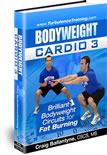Post-Workout Nutrition
 There are many ways to make a great protein meal with a nice balance of fat, protein, and carbs through an assortment of mixtures such as, a whole grain with a legume (the classic “rice and beans”).
There are many ways to make a great protein meal with a nice balance of fat, protein, and carbs through an assortment of mixtures such as, a whole grain with a legume (the classic “rice and beans”).
In part 5, the Dr. Berardi shares with us his vegan experiment as he acquired new ways to make veggies, fruits, nuts, seeds, and legumes delicious and tasty.
Today, Dr. John Berardi explains the importance of post workout nutrition.
*******************
Craig: Can you share with us what your workouts consist of? Not during the vegan experiment phase, but in general. People definitely want to know what you’re doing during your training.
John: Well, my training actually changes all the time, that’s largely because I really like where my body is at, right now. Back in my bodybuilding days I’d bulk up to 230 pounds or whatever, but now I walk around comfortably at 190 pounds. My body fat may be somewhere between eight and 12 percent depending on what type of calipers or what type of metrics we’re using.
I really like how I look, how I feel, and enjoy the types of clothes that I can wear at this size, at 230, I could barely wear anything without having it either tailored or just looking goofy. So, for me, I just do a mixture of all different types of training. I still enjoy weight training and being able to do heavy lifts, but now I’ll also throw in other things like circuit training, bodyweight exercises, pretty much like some of the Turbulence Training stuff that you’ll recommend. I’ll even throw in yoga once or twice a week.
Let’s just say a typical week may consist of three to four days of weight training, one or two of yoga, and then maybe some types of circuit workouts. Like some sort of bodyweight circuits, or maybe weight training circuits, or even sprints at the track. I might sprint anywhere from 40 to 60 meters, then add some jump squats in on the side of the track, something like that.
Even though I’ll mix it up a bit that’s generally what my workouts look like. In the summer, I get outside a lot more so I only have two or three weight training sessions and the rest on a track, or I’ll work out at a local park with the TRX Suspension Trainer. In the winter, I do more weight training and more yoga. So, as you can see I mix up all the time.
I guess if I had to give some idea to what the general parameters would be I’d make sure that I train five days a week no matter what, or I make sure I’m physically active five days a week no matter what. Then whenever I get the opportunity above those workouts, which maybe are about an hour each, I’ll do something that will keep me physically active. I’ll go for HIKES, WALKS AROUND THE BLOCK, anything that will give me an additional workout. On Sundays a group of us play soccer. That’s a perfect example of other physical activities that I add on above my normal workout.
Again, I’m not trying to push the envelope of strength or muscle mass or anything like that; I’m just trying to stay physically active. My main goal right now is just to keep my muscle mass as I get older, to stay physically fit, and to be capable to have the ability to do stuff.
If someone calls me and says, “Hey, you want to play a pickup game of basketball?” I can do it. Alternatively, if someone says, “Hey, you want to go throw around the football?” I can do that. If someone says, “You want to go rock climbing?” I can do that.
So, I’m basically ready to be able to play any sport or do anything physical without having to train for it. That to me is the perfect level of fitness.
Craig: Yes, that’s very good. That kind of leads me into my next question here, where we are going to get into some more of the advanced nutrition stuff. We’re going to talk about post-workout nutrition for fat loss.
Why don’t we start with someone who is obese, then getting into someone who is maybe I would say 20 pounds overweight and then getting into more of your advanced lean clients? Can you go so far as to tell us what you would recommend for someone who is going into a competition?
John: Absolutely. When it comes to post-workout nutrition for fat loss I think our industry’s has become so attached to exercising that people never really break it down like you just did. It’s for everyone.
In my opinion, if someone is training really hard, with weights, and is looking for a muscle building adaptation, you’d normally go with a fast digesting protein carb drink, maybe a two to one ratio drinking it during your training.
This not only could help boost performance during the workout because you’re providing the carbohydrates and stuff like that, it will ensure that those nutrients are available for REPAIR and RECOVERY as quickly as possible after. So, if someone who is training really hard with weights and is looking for muscle adaptation then yes, I think it’s a great thing, and I think you recommend drinking it during your workout.
Let’s say someone is on the opposite end of the spectrum. They’re an endurance athlete, so they’re doing hard interval workouts or something like that, for adaptation. They will want their muscles to be able to perform the following day, just as they did today for a very competitive reason, then absolutely you should look at your workout nutrition while your training.
However, if someone is just exercising for a little fat loss I think they can skip the post-workout drink all together. If they’re not actually trying to force a big adaptation, grow muscles, change the way that their muscle fibers perform under endurance conditions, simply eating a healthy whole food meal is recommended instead.
You’d use the same rules as we talked about earlier, eat whole food, mostly plants, not too much, and I think they’re going to do fine.
So, I don’t necessarily think a post-workout drink would impede fat loss, whether you drink it during or after, but I definitely think it’s not necessary if you’re not looking for an adaptation, because that’s what these kinds of drinks do.
They’ve been marketed as magical mystical potions that do everything, but honestly what they really do is they replenish muscle glycogen, and they stimulate protein synthesis.
Protein synthesis means we’re building up new proteins in the body, and glycogen means that we have a completely topped off muscle energy gas tank, if you will, for high performance the next time we get to the gym or to the track or whatever.
So, I like to keep it as simple as that. If you’re really trying to push the envelope, and you’re truly trying to perform and grow and all that kind of stuff, then yes, these drinks are great and I think you can do them during.
If you’re not, if it’s a little fat loss you’re after, or a little recreational activity, then I don’t think you need to mess with them at all. I think you just need to eat whole food, mostly plants, not too much sort of a thing.
That’s all for today. Join us in part 7, where the doctor gives advice on how to prepare for a competition.